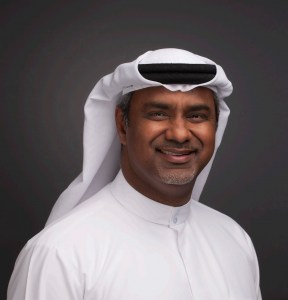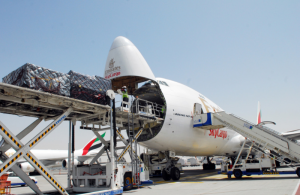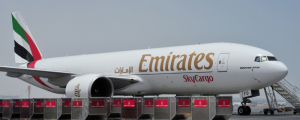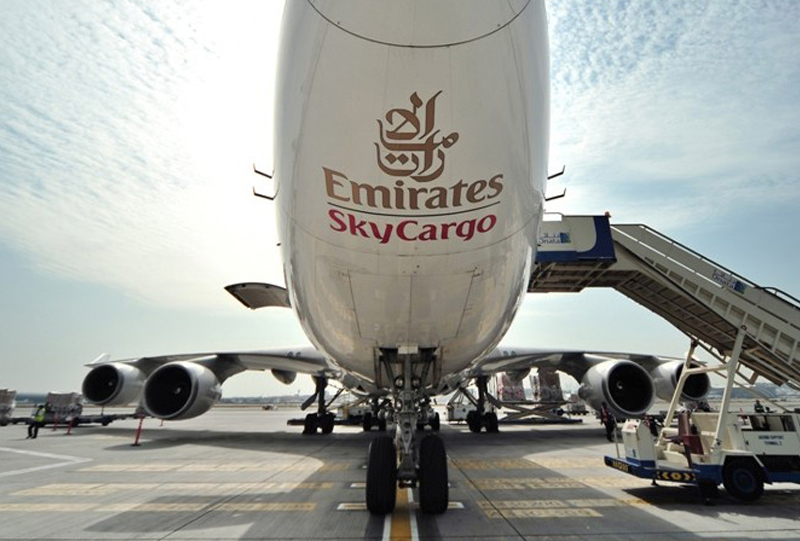A new beginning
Working in the airline industry is not just a job for Nabil Sultan but the fulfilment of an inner calling. The newly appointed Divisional Senior Vice-President of Emirates SkyCargo, speaks to Chandrima Dutta about the direction in which he wants to lead, challenges and his next steps in overall expansion of the company
In 1990, Nabil Sultan chose to be part of an airline that was hardly 5 years in business. Since then Dubai based Emirates has evolved into a globally influential travel and tourism conglomerate.
Steadily rising through the ranks, he had a constantly evolving function as the airline grew from infancy and meandered into an established multi-level organisation.
His career within Emirates spans more than 20 years. He began in 1990 in the IT department, and two years later joined the company’s management training programme with the Commercial department. Between 1995 and 2008, he worked in various management and leadership roles both within and outside the U.A.E, including being Senior Vice President for Commercial Operations West Asia and Indian Ocean, Senior Vice President, Commercial Operations Gulf, Middle East and Iran, and Senior Vice-President, Commercial Operations for Europe. In 2009, he was promoted to Divisional Senior Vice President, Revenue Optimisation and Distribution.
 This year, he took over as head of Emirates SkyCargo from Ram Menen. A modest Sultan says, “I’m excited by the opportunity to further develop and expand the cargo division, building on the success it has achieved to date. Emirates SkyCargo will continue to focus on providing our customers with excellent service, the development of innovative products and services and building our global network and freighter operation.”
This year, he took over as head of Emirates SkyCargo from Ram Menen. A modest Sultan says, “I’m excited by the opportunity to further develop and expand the cargo division, building on the success it has achieved to date. Emirates SkyCargo will continue to focus on providing our customers with excellent service, the development of innovative products and services and building our global network and freighter operation.”
However, as we all know ‘change is never easy’ – Sultan has a mammoth task ahead, that of coping with the division’s rapid growth, a fast evolving business and stiff international competition.
Since his promotion, he has worked tirelessly to achieve his immediate objectives and focussed on SkyCargo’s long-term vision. The fact that he has been in the business for the past 2 decades has helped Sultan understand the tricks of his trade too well – he knows how to sustain and manage a company’s reputation, “one needs to set out a clear vision that combines commercial targets and the company’s values & relationships,” he says.
Below is an excerpt from the interview:
How have the first few months been in your new role?
So far it has been a seamless transition, and uninterrupted day to-day running of the business. However, the first few months on the job have been extremely busy and are fundamental for long-term success.
 What are your short and long-term goals?
What are your short and long-term goals?
My priorities during this initial stage are to establish clear direction, continue to deliver first-class services to existing clients, provide leadership to employees, strengthen our relations with all existing and potential clients and manage our costs effectively.
My long-term goals are to grow our existing business and to secure new sustainable long-term business, improving financial results, add to our global presence, and finally perform at the highest level of industry standards. I also aim to provide a unique and highly competitive level of services by developing our exceptionally skilled, efficient, flexible and multi-skilled employees.
What is your next step in Emirates SkyCargo’s overall expansion and growth programme?
The planned move of our freighter operations from Dubai International Airport to Dubai World Central Al Maktoum International Airport is the next step in Emirates SkyCargo’ s overall expansion and growth programme. It provides us with a brand new facility for our freighter operations and will increase capacity and enable us to meet our long-term objectives.
While the site is being developed, it remains business as usual for us. We are working very closely with Dubai Airports to ensure a smooth transition of our freighter operations. The move does not include passenger fleet belly cargo operations which will continue to operate from Dubai International Airport.
The terminal will have an initial capacity to manage 700 000 tonnes of cargo per annum, which can be expanded to meet future growth. It also provides Emirates SkyCargo with the space to have a larger perishables handling area, with a dedicated pharmaceutical storage area, enabling it to expand its cool chain products and services.
In addition to the cargo terminal, various facilities and infrastructure will be built including 46 truck docks and 80 truck parking spaces, 12 aircraft stands directly in front of the terminal, while additional interface facilities – east and west cross docks will be built at Dubai International Airport.
In general, how strong is the air cargo market in the Middle East?
The Middle East cargo market is buoyant with on-going investment in expansion by regional players supporting the continued flow of cargo volumes both into and through the key markets in the Middle East. In the GCC the infrastructure developments continue to drive the need for materials and supporting logistics, this is particularly noticeable in the UAE, Saudi Arabia and Qatar. The continued expansion and development of airport facilities across the region is also driving growth, once again particularly in those countries mentioned, including Oman and Jordan as well as the long term opportunities that will be seen in Iraq. A thriving and growing consumer society with spare capital to invest and spend on luxury items as well as more standard consumable items, a growing tourist industry whose expenditure on perishable goods when staying at the growing number of hotels will continue to drive demand for food items being moved into the region by air. All signs point to on-going positive momentum for growth.
Plus, latest figures released by IATA show, Middle Eastern airlines are experiencing a continued robust expansion of demand with freight volumes growing by 12.7% year-on-year whereas globally airfreight demand has expanded only 1.2%.
 How has Emirates SkyCargo performed?
How has Emirates SkyCargo performed?
Defying the industry trend, the 2012-13 financial year has been a strong one for Emirates SkyCargo who for the first time reported a revenue over AED 10 billion reaching AED 10.3 billion (US$ 2.8 billion) mark, an 8 per cent increase over last year.
Emirates SkyCargo’s tonnage increased 16 per cent reaching a remarkable 2.1 million tonnes in a shrinking airfreight market, highlighting its ability to grow revenues against the industry norm. This year, freight yield per Freight TonneKilometre (FTKM) decreased by 6 per cent.
Contributing 15 per cent of Emirates’ total transport revenue Emirate SkyCargo continues to play an integral role in the company’s expanding operations.
At the end of the financial year, Emirates SkyCargo freighter fleet totalled 10 aircraft – eight on operating lease and two on wet lease.
Do you feel that emerging markets, particularly India and China are key to your growth strategy?
I believe the future lies in the growth potential of emerging markets such as India and China. For us, both countries remain strong areas of opportunities as we look to expand globally.
Both countries have tremendous potential for investors; India has the advantage of language whereas China has a
disciplined labour force.
Discuss some of the challenges the air cargo industry faces this year?
The international air cargo industry is struggling under the weight of a serious issue: overcapacity. Air freight has encountered severe headwinds as the eurozone fiscal crisis and middling economic recovery in the U.S. put pressure on demand for exports out of Asia, especially China. The exceptions, of course, are high-value products such as Apple iPhones and iPads that tend to create temporary spikes in volume and underpin the industry.
In addition, high fuel costs affect the bottom line of everything, and the impact on our industry cannot be overstated.
Do you feel 2013 is going to be a better year?
Prospects are encouraging for strengthened economies over the course of 2013 and 2014. As far as our industry is concerned, growth is expected to moderately strengthen in 2013, supporting the positive outlook for continued long-term world air cargo traffic growth.
For Dubai and Emirates SkyCargo the good news continues: we have seen incredible growth over the years and we anticipate the same going forward.


